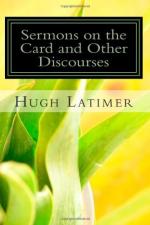We read in a story, that a certain man had eaten his son; but it was done unawares: he knew not that it was his son, else no doubt he would not have eaten him. The story is this: There was a king named Astyages, which had heard by a prophecy, that one Cyrus should have the rule and dominion over his realm after his departure; which thing troubled the said king very sore, and therefore [he] sought all the ways and means how to get the said Cyrus out of the way; how to kill him, so that he should not be king after him. Now he had a nobleman in his house, named Harpagus, whom he appointed to destroy the said Cyrus: but howsoever the matter went, Cyrus was preserved and kept alive, contrary to the king’s mind. Which thing when Astyages heard, what doth he? This he did: Harpagus, that nobleman which was put in trust to kill Cyrus, had a son in the court, whom the king commanded to be taken; his head, hands, and feet to be cut off; and his body to be prepared, roasted, or sodden, of the best manner as could be devised. After that, he biddeth Harpagus to come and eat with him, where there was jolly cheer; one dish coming after another. At length the king asked him, “Sir, how liketh you your fare?” Harpagus thanketh the king, with much praising the king’s banquet. Now the king perceiving him to be merrily disposed, commanded one of his servants to bring in the head, hands, and feet of Harpagus’s son. When it was done, the king showed him what manner of meat he had eaten, asking him how it liketh him. Harpagus made answer, though with an heavy heart, Quod regi placet, id mihi quoque placet; “Whatsoever pleaseth the king, that also pleaseth me.” And here we have an ensample of a flatterer, or dissembler: for this Harpagus spake against his own heart and conscience. Surely, I fear me, there be a great many of flatterers in our time also, which will not be ashamed to speak against their own heart and consciences, like as this Harpagus did; which had, no doubt, a heavy heart, and in his conscience the act of the king misliked him, yet for all that, with his tongue he praised the same. So I say, we read not in any story, that at any time any father had eaten his son willingly and wittingly; and this Harpagus, of whom I rehearsed the story, did it unawares. But the Almighty God, which prepared this feast for all the world, for all those that will come unto it, he offereth his only Son to be eaten, and his blood to be drunken. Belike he loved his guests well, because he did feed them with so costly a dish.
Again, our Saviour, the bridegroom, offereth himself at his last supper, which he had with his disciples, his body to be eaten, and his blood to be drunk. And to the intent that it should be done to our great comfort; and then again to take away all cruelty, irksomeness, and horribleness, he sheweth unto us how we shall eat him, in what manner and form; namely, spiritually, to our great comfort: so that whosoever




